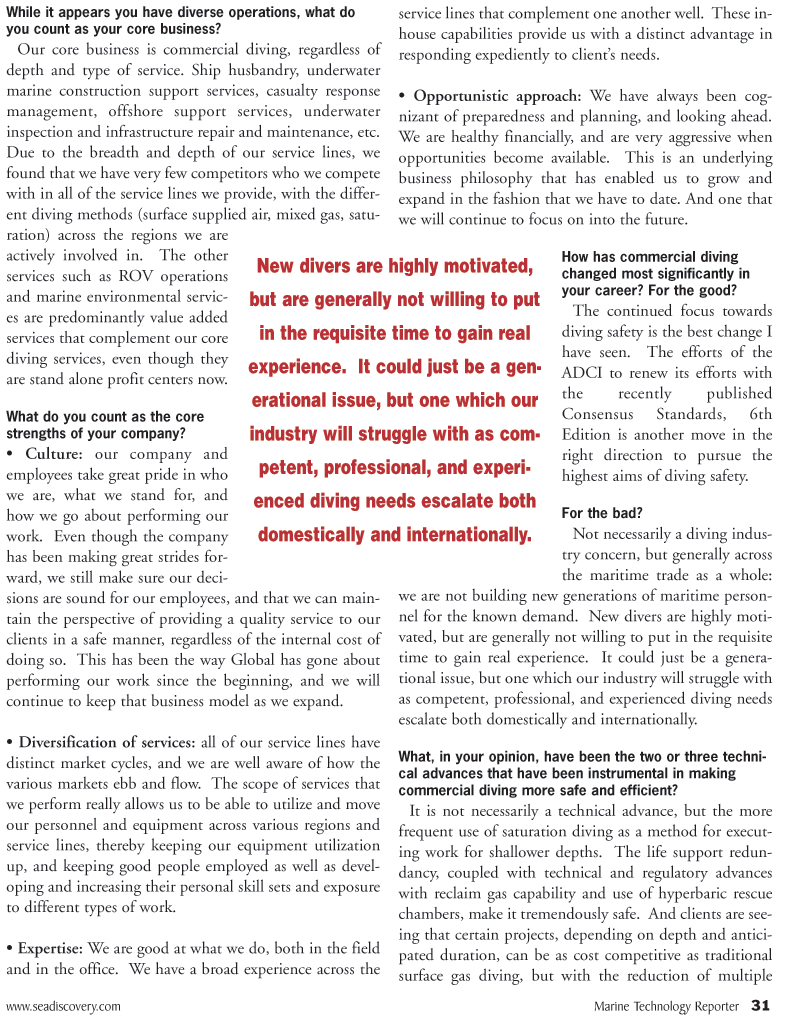
Page 31: of Marine Technology Magazine (January 2011)
Marine Salvage & Recovery
Read this page in Pdf, Flash or Html5 edition of January 2011 Marine Technology Magazine
www.seadiscovery.com Marine Technology Reporter 31
While it appears you have diverse operations, what do you count as your core business?
Our core business is commercial diving, regardless of depth and type of service. Ship husbandry, underwater marine construction support services, casualty response management, offshore support services, underwater inspection and infrastructure repair and maintenance, etc.
Due to the breadth and depth of our service lines, we found that we have very few competitors who we compete with in all of the service lines we provide, with the differ- ent diving methods (surface supplied air, mixed gas, satu- ration) across the regions we are actively involved in. The other services such as ROV operations and marine environmental servic- es are predominantly value added services that complement our core diving services, even though they are stand alone profit centers now.
What do you count as the core strengths of your company? • Culture: our company and employees take great pride in who we are, what we stand for, and how we go about performing our work. Even though the company has been making great strides for- ward, we still make sure our deci- sions are sound for our employees, and that we can main- tain the perspective of providing a quality service to our clients in a safe manner, regardless of the internal cost of doing so. This has been the way Global has gone about performing our work since the beginning, and we will continue to keep that business model as we expand. • Diversification of services: all of our service lines have distinct market cycles, and we are well aware of how the various markets ebb and flow. The scope of services that we perform really allows us to be able to utilize and move our personnel and equipment across various regions and service lines, thereby keeping our equipment utilization up, and keeping good people employed as well as devel- oping and increasing their personal skill sets and exposure to different types of work. • Expertise: We are good at what we do, both in the field and in the office. We have a broad experience across the service lines that complement one another well. These in- house capabilities provide us with a distinct advantage in responding expediently to client’s needs. • Opportunistic approach: We have always been cog- nizant of preparedness and planning, and looking ahead.
We are healthy financially, and are very aggressive when opportunities become available. This is an underlying business philosophy that has enabled us to grow and expand in the fashion that we have to date. And one that we will continue to focus on into the future.
How has commercial diving changed most significantly in your career? For the good?
The continued focus towards diving safety is the best change I have seen. The efforts of the
ADCI to renew its efforts with the recently published
Consensus Standards, 6th
Edition is another move in the right direction to pursue the highest aims of diving safety.
For the bad?
Not necessarily a diving indus- try concern, but generally across the maritime trade as a whole: we are not building new generations of maritime person- nel for the known demand. New divers are highly moti- vated, but are generally not willing to put in the requisite time to gain real experience. It could just be a genera- tional issue, but one which our industry will struggle with as competent, professional, and experienced diving needs escalate both domestically and internationally.
What, in your opinion, have been the two or three techni- cal advances that have been instrumental in making commercial diving more safe and efficient?
It is not necessarily a technical advance, but the more frequent use of saturation diving as a method for execut- ing work for shallower depths. The life support redun- dancy, coupled with technical and regulatory advances with reclaim gas capability and use of hyperbaric rescue chambers, make it tremendously safe. And clients are see- ing that certain projects, depending on depth and antici- pated duration, can be as cost competitive as traditional surface gas diving, but with the reduction of multiple
New divers are highly motivated, but are generally not willing to put in the requisite time to gain real experience. It could just be a gen- erational issue, but one which our industry will struggle with as com- petent, professional, and experi- enced diving needs escalate both domestically and internationally.

 30
30

 32
32
